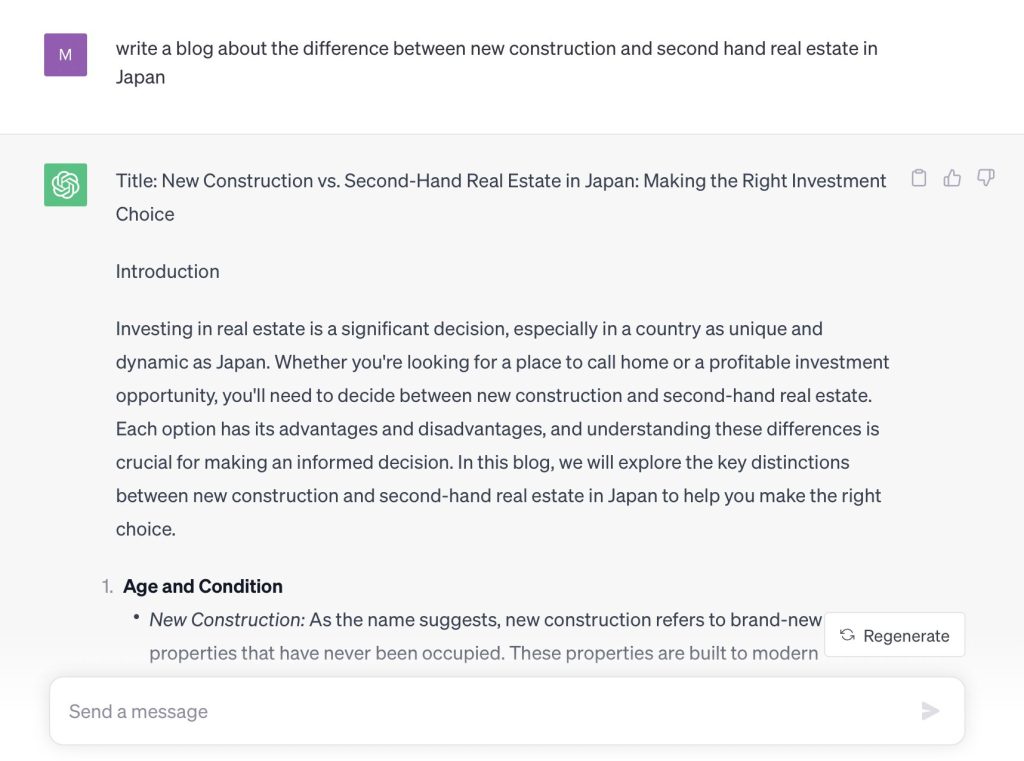
Investing in real estate is a significant decision, especially in a country as unique and dynamic as Japan. Whether you’re looking for a place to call home or a profitable investment opportunity, you’ll need to decide between new construction and second-hand real estate. Each option has its advantages and disadvantages, and understanding these differences is crucial for making an informed decision. In this blog, we will explore the key distinctions between new construction and second-hand real estate in Japan to help you make the right choice.
1. Age and Condition
- New Construction: As the name suggests, new construction refers to brand-new properties that have never been occupied. These properties are built to modern standards, incorporating the latest design trends and technology. This ensures that you won’t have to worry about immediate maintenance or renovations.
- Second-Hand Real Estate: Second-hand real estate, also known as “used” or “pre-owned” properties, can vary widely in terms of age and condition. While some may be relatively new and well-maintained, others could require extensive renovations. Older properties might also need updates to meet current building codes and earthquake resistance standards.
2. Location and Neighborhood
- New Construction: Developers often focus on prime locations for new construction projects. This means you’ll have a better chance of finding newly built properties in desirable neighborhoods with access to essential amenities, schools, and transportation.
- Second-Hand Real Estate: Second-hand properties can be found in a broader range of locations, including established neighborhoods with character and history. However, the availability of second-hand properties in prime areas may be limited.
3. Cost
- New Construction: New construction properties tend to be more expensive than second-hand ones due to their modern features and prime locations. Additionally, there may be additional costs, such as parking fees, maintenance fees, and taxes associated with new builds.
- Second-Hand Real Estate: Second-hand properties are generally more budget-friendly upfront. However, you should consider potential renovation and maintenance costs, which can vary depending on the condition of the property.
4. Customization
- New Construction: When you buy a new construction property, you often have the opportunity to customize it to your preferences, including selecting finishes, layouts, and sometimes even architectural details. This personalization can be a significant advantage for some buyers.
- Second-Hand Real Estate: Second-hand properties come as-is, and while you can renovate and update them to your liking, the level of customization may be limited compared to new builds.
5. Investment Potential
- New Construction: New construction properties tend to appreciate at a slower rate compared to second-hand properties because they are already priced at a premium. However, they can offer stable rental income and long-term value.
- Second-Hand Real Estate: Second-hand properties may have a higher potential for short-term appreciation if located in a desirable area. Investors often look for undervalued second-hand properties with potential for renovation and value increase.
Conclusion
Deciding between new construction and second-hand real estate in Japan is a complex decision that depends on your specific goals, budget, and preferences. New construction offers modern amenities and prime locations but comes with a higher price tag. Second-hand properties, on the other hand, can be more affordable upfront, but may require renovations and updates.
Before making a decision, it’s crucial to conduct thorough research, consider your long-term objectives, and consult with a real estate professional who can provide insights into the local market conditions. Ultimately, the choice between new construction and second-hand real estate in Japan should align with your unique needs and investment strategy.

For additional information or any questions please contact us here
Email: info@remax-apex.com

